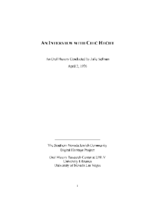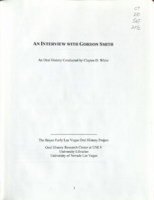Search the Special Collections and Archives Portal
Search Results
Audio clip from interview with Rabbi Sanford Akselrad, October 29, 2014
Date
Archival Collection
Description
Rabbi Sanford Akselrad discusses Project Ezra, an employment program he established during the recession in conjunction with the Jewish Family Service Agency.
Sound

Edith Leavitt interview, February 7, 1977: transcript
Date
Archival Collection
Description
On February 7, 1977, collector Enrico Messina interviewed Edith Leavitt (born April 12th, 1924, in St. George, Utah) at her home in Las Vegas, Nevada. In this interview, Mrs. Leavitt talks about teaching in Southern Nevada, including in the Virgin Valley and in Las Vegas. She also discusses the changing education system in Southern Nevada during her time as an educator.
Text

Chelsie Campbell interview, January 9, 2019: transcript
Date
Archival Collection
Description
Chelsie Campbell is a Cuban-American attorney and lobbyist. Born on October 4, 1979, Chelsie is a native Nevadan and grew up in Las Vegas. Her mother, Norah Campbell, came to Las Vegas after the Cuban Revolution and works as an elementary school teacher. Her father, Alan Campbell, was a former teacher and hotel manager. An advocate for the Latino community, Chelsie has dedicated her life to advocacy. Her involvement began at UNLV where she found her voice through the Student Organization of Latinos (SOL). During her time with SOL, she advocated for the elimination of the social security requirement in UNLV’s admission process and lobbied for the retraction of Las Vegas Review Journal’s racist article on Latino students. Her activism in SOL also helped established additional SOL chapters across Las Vegas high schools and at the College of Southern Nevada. After earning her Bachelors in Broadcast Journalism and Spanish Literature from UNLV, Chelsie attended William S. Boyd Law School where she graduated in 2005. Chelsie also attended University of Nevada, Reno where she received her master’s in Management and a graduate certificate in renewable energy. Chelsie worked for Mach One Group as Editor-In-Chief of its two publications, Nevada Family Magazine and La Familia de Nevada. After law school, Chelsie began working at NV Energy as a spokesperson and worked her way up to government affairs. Chelsie is currently working as an independent lobbyist and choses her clients. Her clients include Clark County School District and NV Energy. Her work as a lobbyist includes helping agencies prepare for Nevada’s legislative session, conduct public policy research, and help with educational outreach. Through her activism, Chelsie has worked for former Senate Majority Leader, U.S. Senator Harry Reid. Chelsie is also part of the inaugural class of Emerge Nevada, a political leadership-training program for women in Nevada. Chelsie is on the Board of Trustees for the Leukemia and Lymphoma Society of Southern Nevada, the Chairwoman for the Nevada Advisory Board for CPLC Southwest, Board Member for the Advisory Commission on law-related Education for the State Bar of Nevada and serves on the Governmental Affairs Committee for the Latin Chamber of Commerce. She is the former President for the Boyd Law School Alumni Chapter and the Board of Directors for the Gray Plunkett Jydstrup Living Facility. Chelsie would like to dedicate her oral history to her parents: Without them, I wouldn’t be here.
Text

Transcript of interview with Isabella Jessie Curtis by Andrew B. Levy, February 15, 1979
Date
Archival Collection
Description
On February 15, 1979, Andrew Levy interviewed Isabella Jessie Curtis (born 1922 in Monroe, Wisconsin) about her experiences in Southern Nevada. Curtis first talks about her career in waitressing at several restaurants and casinos in Las Vegas before describing some of the early businesses in the Downtown Las Vegas area. The interview then moves to discussions on Curtis’s involvement in politics, her early recreational activities, and the atomic testing. The two later discuss the first telephones in Las Vegas, the Helldorado celebration, and her work at the Tropicana Las Vegas. The interview concludes with Curtis’s description on living in Sandy Valley, Nevada, and some of her first memories of the Union Pacific train depot in Las Vegas.
Text

Transcript of interview with Dan Hill by John Bennett, March 1, 1979
Date
Archival Collection
Description
On March 1, 1979, John L. Bennett interviewed Dan Hill (born May 20, 1914 in Illinois) in his home at 2130 Walnut Road, Las Vegas, Nevada, about his memory of Southern Nevada. In addition to the collector and informant, there is an unidentified woman present during the interview. Hill explains that he originally came to Nevada in search of work. He briefly moved to Europe during the First World War where he served in the Army; at the end of the war, Hill returns to Las Vegas to work at the Nevada Test Site. Hill then goes in-depth about his experience as a worker at the Nevada Test Site and different mining sites that he had also worked at. The two briefly discuss the different sheriffs that had been in charge of Las Vegas, and how many people came to Las Vegas to work at the Henderson Magnesium Plant and Hoover Dam in addition to the Nevada Test Site.
Text

Transcript of Interview with Merna Dennison by Ken Pyatt, March 1, 1980
Date
Archival Collection
Description
Text

Transcript of interview with Millicent Rosen by Barbara Tabach, June 23, 2015
Date
Archival Collection
Description
Until her passing in 2017, Millicent (Siegel) Rosen was the living link to Benjamin “Bugsy” Siegel, one of Las Vegas’ most notorious links to the Jewish mob. A steadfastly independent woman herself, Millicent recalls Benjamin as a loving father to her and her younger sister. She is proud of his status as a Las Vegas visionary, though she affixes a footnote that the city of today might not be to his liking. She includes a few anecdotes about common names of the early days, including Meyer Lansky who walked her down the aisle when she married Jack Rosen. They had three children: Benjamin, Cindy, and Wendy. Millicent moved to Las Vegas to be with her daughter and her family in about 2000 and cherished her role as a grandmother. Always an artist at heart, Millicent once painted canvases for needlepoint and in 2015 promoted her clothing line.
Text

Transcript of interview with Walter Dane by Ann Clark, March 11, 1978
Date
Archival Collection
Description
On March 11, 1978, Ann K. Clark interviewed her step grandfather, tire repairman Walter Dane, (born August 10th, 1914 in West Barnett, Vermont) in her, the interviewer’s, home in North Las Vegas. Also present during the interview is the interviewer’s mother, Marie Dane. Walter relocated to Indian Springs in 1930 before settling in Las Vegas in 1943. In 1968 he moved to Utah, where he resided at the time of this interview. Well-traveled, Walter discusses his many moves over the years. Ultimately, this interview covers the growth and development of the Las Vegas and Indian Springs areas.
Text

Transcript of interview with Chic Hecht by Julie Sefman, April 2, 1976
Date
Archival Collection
Description
Interview with Chic Hecht Julie Sefman on April 2, 1976. In this brief interview, Hecht talks about his time in the state senate working to bolster the budget with sales tax and gaming tax, starting a community college and health programs. He also talks about Pop Squires, a newspaper man and advocate for building Hoover Dam, who had a home on the site of Chic Hecht's clothing store on Fremont Street. Hecht also describes his time in the military and his involvement with the Military Intelligence Association.
Text

Transcript of interview with Gordon Smith by Claytee White, January 29, 2013
Date
Archival Collection
Description
Gordon Smith was born in Utah, but moved with his family to Babbitt, Nevada in 1947. His father, a barber, moved the family to Las Vegas in 1955. In this interview, Gordon recalls school and after-school pursuits; changes in the town; summer jobs; and college. He also talks about his military service and returning to Las Vegas to take up the razor himself - starting a successful barbering business of over 30 years.
Text
